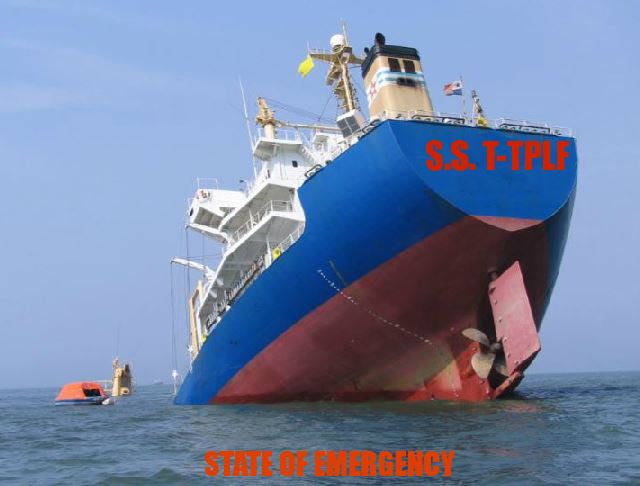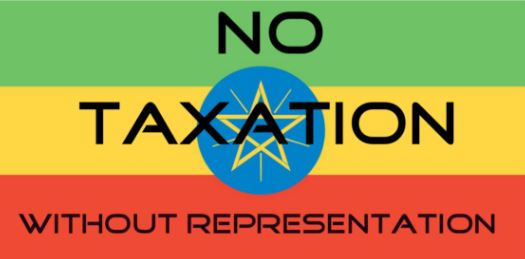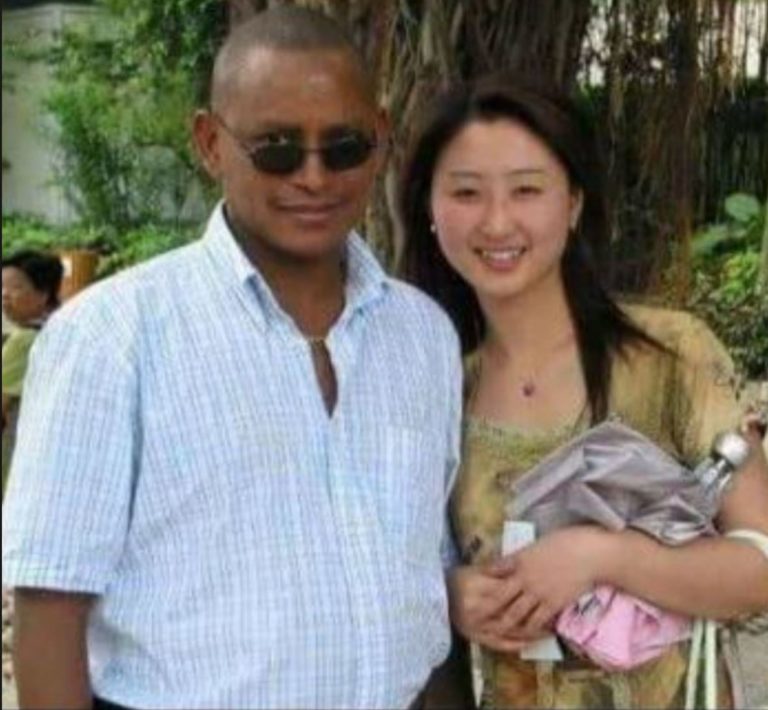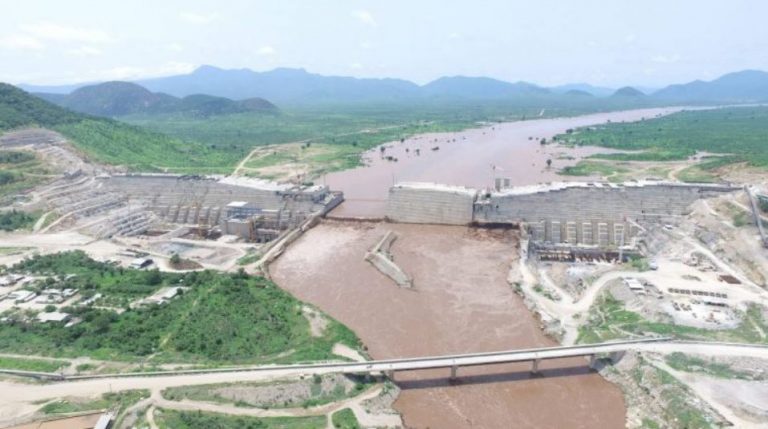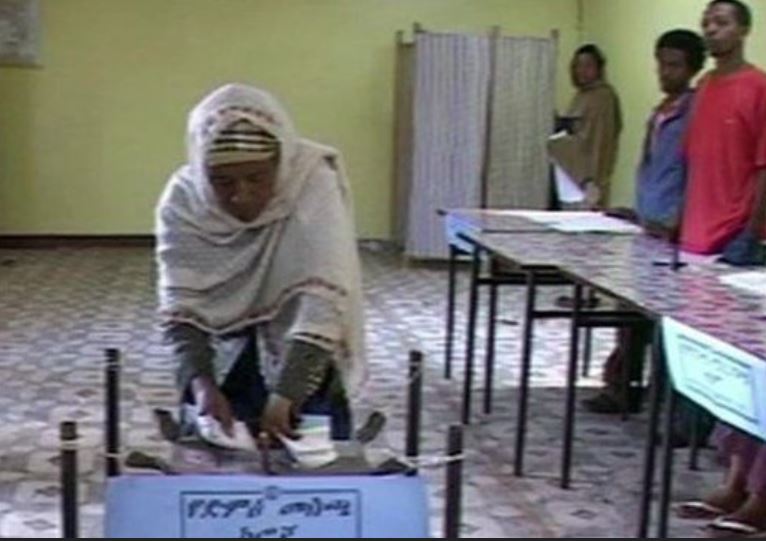Ethiopia: State of Emergency or T-TPLF S.O.S. (Save Our Souls/Ship) Emergency?
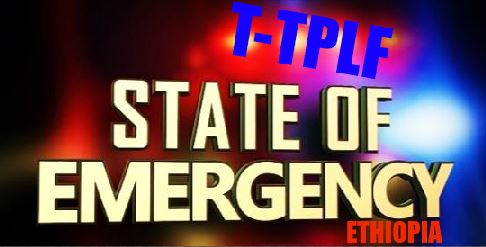 The jig is up for the T-TPLF! Game over!
The jig is up for the T-TPLF! Game over!
Did the T-TPLF just pull off a publicity stunt by declaring a “state of emergency”?
Or was it a big distress signal the T-TPLF sent out, “Save Our Souls/Save Our Ship”?
I enjoy T-TPLF scams, disinformation, hypes and con games.
I really do. I even grudgingly admire them T-TPLF dudes on how they use their weapons of mass distraction. Ain’t they slicker than a can of grease?
The thing I don’t like about them is that they believe they can roll out one scam after another and pull the wool over everyone’s eyes.
The latest T-TPLF scam and con game is “state of emergency” (SoE).
On October 9, 2016, T-TPLF puppet prime minister (PPM) Hailemariam (more appropriately crime minister) declared a “state of emergency”.
Big deal!
With T-TPLF boots one their necks, Ethiopians have been under an undeclared state of emergency for the past 25 years.
For crying out loud! Ethiopia has been in a de facto state of emergency — a police state — for the last 25 years.
When Erin Burnett of CNN visited Ethiopia in July 2012, she described what she saw in stark terms:
We saw what an African police state looked like when I was in Ethiopia last month… At the airport, it took an hour to clear customs – not because of lines, but because of checks and questioning. Officials tried multiple times to take us to government cars so they’d know where we went. They only relented after forcing us to leave hundreds of thousands of dollars of TV gear in the airport…
Now, the T-TPLF wants to make its police state official in a “state of emergency decree”?
I don’t buy any of the T-TPLF’s “state of emergency” rubbish.
But the Western media bought all of the hoopla (more accurately crapola) hook, line and sinker.
On October 9, 2016, the mighty New York Times (and many others including the BBC) headlined its report, “Ethiopia Declares State of Emergency to Stop Protests.”
No kidding?
Well, I don’t pay much attention to the mindless Western press (I did not say Western parrots) reiterating the official T-TPLF disinformation and passing it on to the world as news.
Call me “curmudgeon” if you like. But my view on much of what passes as journalism today is the same as H.L. Mencken’s who said, “American journalism (like the journalism of any other country) is predominantly paltry and worthless. Its pretensions are enormous, but its achievements are insignificant.” Touche!
The whole “state of emergency” declaration by the T-TPLF sounded to me as though it is the T-TPLF itself that in a state of emergency. It’s more like the T-TPLF is on life support in the ICU.
On October 9, the T-TPLF did not declare a state of emergency for the Ethiopia. It declared an emergency S.O.S. for the “S.S. T-TPLF”.
There is no question about it. The T-TPLF Ship of State is sinking, and sinking fast.
The S.S. T-TPLF has been struck by a tsunami of the Ethiopian peoples’ anger, frustration and outrage.
The S.S. T-TPLF is going DOWN! DOWN! DOWN! (Did someone say, “Down, down, Woyane!?”)
Flying the “State of Emergency” flag on the “S.S. T-TPLF” is not going to save it.
In a 20-minute television statement, a gaunt, haggard and sallow (I did not say shriveled) PPM flew the “state of emergency flag” and blathered about the reasons for declaring the SoE.
In delivering “his” statement, the PPM looked unsure of himself. His words lacked conviction. He looked robotic reciting some programmed words on a screen. His usual swagger and bluster was completely gone. His body language showed extreme tension, anxiety and stress. He clasped his hands tightly for the entire 20 minutes. His body posture remained stiff for the entire time; he barely bobbed his head. He seemed almost impaled to the television screen. His facial expression was blank. He seemed to have dry mouth. His eyes flitted but his gaze was fixed on the screen from which he was reading. The pitch, intonation and volume of his voice dissipated into tedious monotony. He sounded to me like the class monitor in high school telling everybody what the teacher said.
Was PPM Hailemariam the messenger boy for someone else sitting in the dark behind the throne?
The PPM in “his” statement repeated himself like a broken record (possibly for emphasis but more likely to captivate his audience and keep them glued to his message since most Ethiopians would naturally walk away in disgust after listening to a few seconds of his drivel). The gist of the PPM’s statement is summarized as follows:
First, anti-peace elements (does that mean terrorists? Does it mean pro-war? If so, why not call them “pro-war?) allied with foreigners have undermined the peace and stability of the people (of Ethiopia);
Second, the regular process of pacifying (suppressing) actions (by anti-peace elements) has proven ineffective and as a result people are dying including foreign citizens and ethnic and sectarian strife is increasing. The only way to return to peace and stability fast is through the SoE.
Third, Ethiopia is a country where local capitalists and foreign investors have created great wealth (Could he be referring to T-TPLF crony capitalists?) and many development projects supported by taxes and foreign loans are in place. The (anti-peace elements) are destroying these projects and government offices and have caused economic retaliation (boycotts?) by persuading store keepers to shut down their stores. Unless swift action is taken, these problems will continue.
Fourth, the SoE is constitutional and authorized by Article 93.
Fifth, emphatically, fundamental human rights will not be violated or trampled under the SoE. Rights secured under the “Vienna Convention” will be protected and observed. A parliamentary oversight body will ensure human rights violations are not caused by the SoE.
Sixth, the governance system needs deep and extensive reforms. There are practices in (the T-TPLF) regime that reveal democratic deficits, which will be identified (extracted) and corrected. Reforming the “democratic structure” is a big job (for the T-TPLF). There is a need for legislative oversight of executive branch activities.
Seventh, the (T-TPLF) is ready to engage civic and professional organizations in discussions and dialogue to expand and deepen our democracy. It is vital to make our democracy deep and wide.
Eight, the (T-TPLF) is ready to engage political parties on different agendas and discuss political reform with them.
Ninth, Ethiopia’s development and progress is at extreme peril as a result of the (mass uprisings). The (T-TPLF) pleads with the people not throw out the baby (development) with the dirty bathwater (the T-TPLF). We need to correct mistakes very fast.
Tenth, all Ethiopians must come together and fight against an (unidentified) foreign enemy.
The T-TPLF’s dour-faced prosecutor provided a rambling explanation of the SoE reading from what appeared to be talking points.
The T-TPLF prosecutor’s mantra was “Command Post”. He talked about how the SoE will be implemented by the “Command Post”. He was so cryptic about the “Command Post”, I thought he was talking about the Boogey Man coming after anyone violating the SoE.
The gist of the “prosecutor’s” statement is summarized as follows:
First, the “Command Post” will implement the state of emergency order. (He offered no explanation what the so-called command post is.)
Second, the “Command Post” is responsible for the investigation and apprehension of anyone engaged the following activities and take action:
Suspicion of inciting any kind of chaos, strife, mistrust and misunderstanding among peoples in public or covertly;
Preparing, writing, publishing and disseminating writings, putting on dramatic shows, using symbols (such as crossed hands at the wrist over one’s head) or making any kind of public message and
Engaging in public gathering or assembly.
The “Command Post” has the power to:
Close all communications means (internet and telephone?);
Arrest without a court order anyone suspected of incitement;
Search any home or vehicle and stop and frisk of any person without probable cause or reasonable suspicion.
Impose curfew.
According to the T-TPLF prosecutor, the “command post” has the power to
Require all citizens to obey and cooperate with the SoE.
Impose a sentence of 5 year at hard labor for those found guilty of suspected involvement in the vague . Those who fail to cooperate get 3 years.
T-TPLF spokesman Getachew Reda said the “state of emergency” will last for 6 months.
The SoE is UNCONSTITUTIONAL
Under the T-TPLF constitution a “state of emergency can be declared if authorized by the “council of ministers” (Art. 93(a)). If the House of Peoples’ Representatives is in session, the decree shall be submitted to the House within forty-eight hours of its declaration for approval by “two-thirds majority vote”. (Art. 93, 2(a).) However, “a state of emergency decreed by the Council of Ministers, if approved by the House of Peoples’ Representatives, can remain in effect up to six months.”
In other words, for the Declaration to be effective for a period of 6 months, it is mandatory that the “House of Peoples’ Representatives” approve it by at least “two-thirds majority vote”. There is no evidence that the constitutionally required approval has been obtained to implement the SoE declared by the “Council of Ministers” for six months.
There is no evidence the so-called House of Peoples’ Representatives (of which all 547 members belong to the T-TPLF party) actually acted, even on a pro forma basis, on the state of emergency declaration. There is no evidence “two-thirds of the House” voted to approve any declaration of a state of emergency.
By failing to comply with the prescribed constitutional process, the T-TPLF once again trashed its own constitution.
PPM Hailemariam talking about the status of human rights during the SoE said, “In this regard, as set forth in the constitution, there are two things, rights that cannot be violated or trampled or splintered (under the SoE). The first is, as set forth in the constitution, fundamental human rights will be observed without violation under no circumstances. Under the state of emergency, human rights will be given a big focus. I want to make it public that there will be no violation of human rights under the emergency declaration.”
It seems the PPM is totally clueless of what human rights are; or he has no idea what his chief prosecutor is saying about arbitrary arrests, detentions and the rest of it.
Arresting anyone without probable cause or reasonable suspicion (arbitrary detention) is a violation of human rights. Denial of due process (denial of regular judicial proceedings and a fair trial to suspects) is a violation of human rights. Searching a person’s home or vehicle or stopping and frisking anyone without probable cause or reasonable suspicion is a violation of human rights. (International Covenant on Civil and Political Rights, Article 17.) Blanket censorship is a violation of human rights.
Both the PPM the T-TPLF attorney general made references to certain “human rights” (without explicitly stating them) as completely off-limits under the SoE declaration; but those references are principally concerned with the use of torture. The fact of the matter is that the T-TPLF regularly uses torture on detainees under its so-called anti-terrorism law. In its 2013 report, Human Rights Watch stated, “Ethiopian authorities have subjected political detainees to torture and other ill-treatment at the main detention center in Addis Ababa.”
It seems the SoE is not only unconstitutional but also in violation of well-established human rights treaties and conventions to which Ethiopia is a party.
Since the SoE is manifestly unconstitutional, could it be deemed a de facto declaration of martial law?
The T-TPLF prosecutor stated the SoE will be implemented by a “Command Post”.
The T-TPLF prosecutor did not say a “civilian command post”. Did he intentionally omit the word “civilian” because he wanted to fudge the nature of the “command post”, or thought it is reasonably obvious that it will be a military command post.
I am puzzled by the T-TPLF prosecutor’s references to “command post” as the enforcement agency for the SoE.
I am aware of two general types of “command posts” in operation in most places in the world. One is an “emergency command post” that oversees operations post-natural disasters or other man-made events of extreme urgency. The other is a military “command post” where a commander and his staff at a particular headquarters operate the command post.
Given the nature of the tasks of the T-TPLF’s SoE “command post”, it is clear to me that the “command post” will be a military one without explicitly stating so.
Supporting the foregoing interpretation are the following factors:
1) The specific tasks delegated to the “Command Post” can be carried out most effectively by a military force unaccountable to any civilian authority.
2) The constitution has been suspended for all intents and purposes.
3) The courts are prohibited from exercising judicial review over the actions of the “Command Post”. Instead, the courts are replaced by a military or quasi-military authority to determine guilt.
3) Those detained by the “Command Post” will not have the right to legal representation, nor the legal capacity to challenge their detention through their lawyers.
4) The “Command Post” has plenary powers. That means absolute power. Such power exists only under martial law and in complete disregard for civilian judicial or political institutions.
Declaration of State of Emergency is common in dictatorships
Most dictatorships at one point or another declare states of emergency.
On May 16, 2005, one day after the parliamentary election, Meles Zenawi declared a state of emergency, outlawed all public gatherings and placed under his direct personal command and control all police, security and military forces, and replaced the capital city police with federal police and special forces.
In the coming weeks, Meles’ forces went on a killing rampage slaughtering nearly 200 innocent protesters and severely wounding nearly 800 others. The unarmed protesters were hunted down and shot in the streets and in their homes simply because they chose to exercise their right to peaceably protest that rigged election.
In its November 2010 report Human Rights Watch reported, “In November 2005, nearly 200 people were killed by security forces in Addis Ababa, and an estimated 30,000 people in Addis Ababa and other towns were arrested and transported to military camps outside of Addis Ababa.”
In July 2016, Turkish president Recep Tayyip Erdogan declared a state of emergency following an alleged coup attempt. According to Reuters, more than 100,000 public officials, including members of the police, civil service and military, have been dismissed or suspended from their jobs in the ensuing crackdown. About 40,000 people have been detained. The Turkish justice minister a couple of weeks ago announced that some 32,000 people have been formally arrested as part of the investigation into the suspected Gulenist network.
Egyptians lived under an Emergency Law (Law No. 162 of 1958) from 1967 to 2012 (Arab Spring). (See my May 2011 commentary, “Africa’s Youth United Can Never be Defeated”.)
In May 2013, Goodluck Jonathan of Nigeria declared a state of emergency for the entire northeastern states of Borno, Yobe and Adamawa.
Many Latin American and East Asian countries have toyed with states of emergency.
The current T-TPLF declaration of state of emergency is very similar to Apartheid South Africa’s
In 1960, the apartheid for the first time faced widespread revolt throughout South Africa particularly against the pass laws. As the revolt began to spread, the white minority regime was alarmed and threatened by popular revolt. (See my May 2015 commentary, “Remembering the Sharpeville Massacre in South Africa”.)
On March 21, 1960, unarmed black South African went to a police station to peacefully protest. The police fired on the crowd killing 69 people and injuring 180. Strikes and other labor actions followed and the apartheid state declared a State of Emergency for the first time. The apartheid regime passed other measures and banned both the African National Congress and other organizations. Over 25 thousand people were arrested within less than two months of the Declaration. Detainees were held without access to lawyers and family and even placed in solitary confinement.
The T-TPLF declaration in much the same way as the 1960 apartheid state emergency declaration prohibits all protest and demonstrations, authorizes arbitrary arrests, prolonged detentions and extrajudicial actions by any authority of the government. The T-TPLF declaration also prohibits judicial review and bans all expressive freedoms including speech and assembly. (See my May 2016 commentary, “The “Law” as State Terrorism in Apartheid Ethiopia”.)
In July 1985, the apartheid white minority regime declared another State of Emergency. The Declaration granted wide powers to police, soldiers and other authorities. Under the 1985 state of emergency declaration, the police and any other state authority: 1) can search anyone’s (black people) house and take away anything they want; 2) stop any meeting, 3) arrest anyone and keep them in jail for as long as they like; 4) the head of police can stop the newspapers from writing anything about the State of Emergency. 5) newspapers cannot give the names of people in jail without reporting their names; police have the power to impose curfews; 6) the police cannot be challenged in court, 7) detainees can have any visit, including family visits, only if the police approve, 8) the police can impose solitary confinement for any detainee, 9) a sick detainee does not have a right to medical care.
Following both declarations, the apartheid regime was able to detain not only thousands of political activists within a short time but also minor children and old people suspected of not cooperating. Ironically, the state of emergency and other repressive measures intensified and expanded the opposition to apartheid, ushering in three decades of resistance and protest in the country and increasing condemnation by world leaders.
That is exactly what the T-TPLF “state of emergency” decree does today!!!
The T-TPLF declaration of “state of emergency” is a publicity stunt: Here is the evidence
Using its so-called anti-terrorism law (Proclamation No. 652/2009), the T-TPLF has been doing everything it says it wants to do under the declaration of state of emergency.
There are two differences. First, in the SoE the targets are “anti-peace elements”. In the “antiterrorsim law”, the the targets are “terrorists”. Second, terrorism suspects at least get kangaroo (monkey) court trials. Anti-peace elements do not.
Section (5) of the T-TPLF anti-terrorism proclamation condemns as “terrorist” anyone who “provides a skill, expertise or moral support or gives advice… makes available any property in any manner… monetary, financial or other related services … provides any training or instruction or directive”. Section (6) criminalizes as a terrorist act publication of “a statement that is likely to be understood by some or all of the members of the public as a direct or indirect encouragement… of an act of terrorism…” Section (7) criminalizes the “recruitment” of any person “for the purpose of a terrorist organization or committing a terrorist act.”
The T-TPLF anti-terrorism proclamation authorizes warrantless searches and seizure. Section (14) allows warrantless “interception and surveillance on the telephone, fax, radio, internet, electronic, postal and similar communications of a person suspected of terrorism”, “enter into any premise in secret to enforce the interception” or “install or remove instruments enabling the interception.” It further allows any “police officer who has reasonable suspicion that a terrorist act may be committed and deems it necessary to make a sudden search…, stop vehicle and pedestrian in an area and conduct sudden search at any time, and seize relevant evidences.”
Section (19) of the T-TPLF Proclamation authorizes any police officer to “arrest without court warrant any person whom he reasonably suspects of terrorism.” Section (20) allows the court to grant endless continuances and postponements so that the police/prosecutor “for sufficient period to complete the investigation.” Section (23) allows the admission of unverified intelligence reports, hearsay or indirect surveillance evidence including those gathered by “foreign law enforcement bodies” and “confessions of suspects, including coerced confessions. Section (25) authorizes the “House of Peoples’ Representatives” the power to list and de-list an organization as terrorist organization. Section (37) allows the “Council of Ministers” to issue “regulations necessary for the implementation of this proclamation.
Under the ambiguous, vague, sweeping and overbroad language of the T-TPLF proclamation, any act, speech, statement, and even thought, could be punished. Anyone the T-TPLF prosecutor/police believe or make-believe is engaged in “advancing a political, religious or ideological cause” and intending to “influence the government”, “intimidate the public”, “destabilize or destroy the fundamental political, constitutional, economic or social institutions of the country” could be condemned to long imprisonment or suffer the death penalty. The T-TPLF police and prosecutors could charge anyone they wanted without so much as a scintilla of evidence of wrongdoing. Making or publishing statements “likely to be understood as encouraging terrorist acts” is a punishable offense. Anyone alleged to have provided “moral support or advice” or has had any contact with an individual accused of a terrorist act is presumed to be a terrorist supporter.
Under the T-TPLF proclamation, anyone who “writes, edits, prints, publishes, publicizes, disseminates, shows, makes to be heard any promotional statements encouraging, supporting or advancing terrorist acts” is deemed a “terrorist”. Peaceful protesters who carry banners critical of the regime could be charged for “promotional statements encouraging” terrorist acts. Anyone who “disrupts any public service” is considered a “terrorist” (Section 3); and workers who may legitimately grieve working conditions by work stoppages could be charged with “terrorism” for disruption.
Under the T-TPLF proclamation, a person who “fails to immediately inform or give information or evidence to the police” on a neighbor, co-worker or others s/he may suspect of “terrorism” could face up to 10 years for failure to report. Two or more persons who have contact with a “terror” suspect could be charged with conspiracy to commit “terrorism”.
The procedural due process rights (fair trial) of suspects and the accused guaranteed under the T-TPLF constitution and international human rights conventions are ignored, evaded, overlooked and disregarded by the proclamation. “The police may arrest without court warrant any person whom he reasonably suspects to have committed or is committing a terrorism” and hold that person in incommunicado detention. The police can engage in random and “sudden search and seizure” of the person, place or personal effects of anyone suspected of “terrorism”. The police can “intercept, install or conduct surveillance on the telephone, fax, radio, internet, electronic, postal, and similar communications” of a person suspected of terrorism. The police can order “any government institution, official, bank, or a private organization or an individual” to turn over documents, evidence and information on a “terror” suspect.
A “terror” suspect can be held in custody without charge for up to “28 days” with unlimited renewals. Any “evidence” presented by the regime’s prosecutor against a “terror” suspect in “court” is admissible, including “confessions” (extracted by torture), “hearsay”, “indirect, digital and electronic evidences” and “intelligence reports even if the report does not disclose the source or the method it was gathered (including evidence obtained by torture). The “law” presumes the “terror” suspect to be guilty and puts the burden of proof on the suspect/defendant in violation of the universal principle that the accused is presumed innocent until proven guilty. Any evidence including involuntary confessions and hearsay could be used in court as evidence. The T-TPLF proclamation bars habeas review or pretrial judicial intervention even to adjudicate detainee allegations of abuse and torture.
In the police state Ethiopia has become, opposition political and civic leaders and dissidents are kept under 24/7 surveillance, and the ordinary people they meet in the street are intimidated, harassed and persecuted. The climate of fear that permeates every aspect of urban and rural society is reinforced and maintained by a structure of repression that is vertically integrated from the very top to the local (kebele) level making impossible dissent or peaceful opposition political activity. As former president under the T-TPLF and currently an opposition leader Dr. Negasso Gidada has documented, the structure of state terrorism in Ethiopia is so horrific one can only find parallels for it in Stalin-era Soviet Union. According to Negasso, “The police and security offices and personnel collect information on each household through other means. One of these methods involves the use of organizations or structures called “shane”, which in Oromo means “the five”. THE T-TPLF STATE OF EMERGENCY DECREE IS A PUBLICITY STUNT!!!
The State of Emergency declaration is another T-TPLF disinformation con job
The T-TPLF state of emergency decree is another disinformation campaign. The T-TPLF hopes to achieve six objectives.
First, The T-TPLF hopes the SoE will create a Fear Factor in the population at large. When people are being massacred by the thousands, they fear nothing. The people of Ethiopia have reached a defining Shakespearean moment: “A coward dies a thousand times before his death, but the valiant taste of death but once. It seems to me most strange that men should fear, seeing that death, a necessary end, will come when it will come.”
Second, the T-TPLF hopes to steal the headlines from the Irreecha Massacre. The T-TPLF hopes to change the subject from the Irreecha Massacre to their silly emergency declaration. To a limited extent, they have succeeded in this at least in the Diaspora Ethiopia. As I scour social media and the websites, the talk seems to have changed from the Irreecha Massacre to the emergency declaration.
Third, the T-TPLF hopes its declaration will be a game changer. They hope the people of Ethiopia and the Western donors, loaners and international poverty pimps will use the declaration as a basis for some sort of a negotiated settlement. The fact of the matter is that the declaration is not a game changer; it is just a T-TPLF game of disinformation. It is nothing more than a T-TPLF publicity stunt.
Fourth, the T-TPLF hopes the declaration will help it regain the illusion of invincibility it had created over the past 25 years. In practical terms what the T-TPLF is saying with its declaration of a state of emergency is that they can massacre, kill, jail, persecute, prosecute their way back to business as usual. It ain’t happening!
Reality check: Is it not true that the T-TPLF has been massacring, jailing, killing, persecuting and prosecuting anyone they pleased over the past 25 years? What else is new? Has any T-TPLF official ever been brought to justice in the last 25 years for crimes against humanity?
Fifth, the T-TPLF wants to send the message to its loaners and donors that it is still in control of the country. The declaration gives T-TPLF leaders the opportunity to publicly claim that they have the military and civil administrative capacity to enforce their political will. The fact is the T-TPLF’s administrative offices in the rural areas are going up in smoke and the T-TPLF lackeys are abandoning their posts and joining the people or just beating feet. The fact is that the T-TPLF administrative structure has disintegrated completely except perhaps in the capital and its own stronghold.
Sixth, the T-TPLF aims to scare the people that it can jail everyone it does not like. How much prison capacity does the T-TPLF have left to add more prisoners and detainees? I guess it could be limitless since the T-TPLF is burning its prisons to reduce overcrowding by claiming the inmates died from a “stampede” . There have been at least 3 major fires in T-TPLF prisons over the past three years with hundred burned to death.
I believe the T-TPLF state of emergency declaration is a form of psychological warfare being waged on the people. It is the T-TPLF’s last ditch effort to inspire fear in the population and suppressing the uprising that is spreading like wildfire.
But it is an empty threat. There is nothing more the T-TPLF can do with its emergency declaration that it has not been able to do over the last 25 years. But they still believe they can outsmart and outfox the people and get them back in the state of fear through a state of emergency.
Still the T-TPLF hopes against hope that the silly declaration will crush the peoples’ spirit, erode the peoples’ will to resist, disrupt their networks, confuse their thinking process and destroy their will to fight and resist. They hope to be able to destroy the morale of the popular resistance. They hope to create dissension among the opposition, ultimately leading to a surrender.
Sorry, T-TPLF. Those days are over!
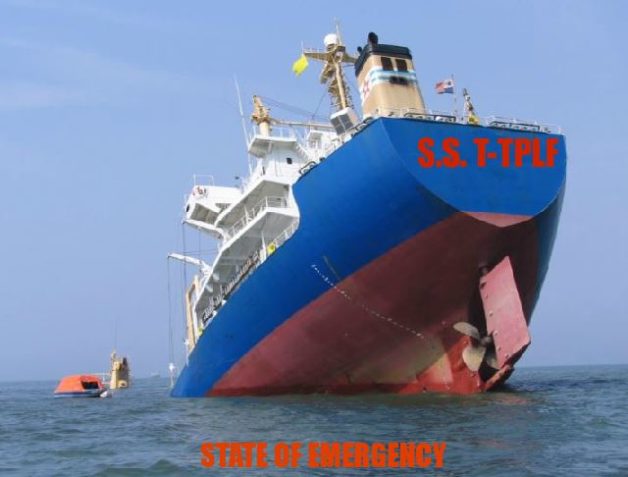 The real reason for the state of emergency: T-TPLF is crying out, “Save Our Souls”, Save our Ship (of State)
The real reason for the state of emergency: T-TPLF is crying out, “Save Our Souls”, Save our Ship (of State)
Let’s get down to the nitty-gritty. What’s all this state of emergency crap about?
Just one thing. The T-TPLF is trying to get its behind out of the ringer in an “honorable” way. The PPM spent nearly half of his speech pleading for another chance. Pleeese, pleeese Ethiopian people, give us one more chance to get it right….
The WHOLE purpose of the state of emergency declaration is to get the people’s attention so that the T-TPLF can get down on its knees and beg for one more chance to do it right.
This is what the PPM said:
In this regard, as set forth in the constitution, our aim is to continue the work started by the people and the government . Our government’s system of governance needs to be renewed (rehabilitated). We have started a competent mobilization process. We will reshape our (administration) from top to bottom and address the questions raised by the people and their complaints about the services the government should give them. This is one of our biggest goals. Second, the governance process must be rehabilitated. We have to do deep reforms. In so doing, we will extract those things that are democratic deficits and correct them. Reforming our democratic structure is another one of the big jobs we have to do. That means increasing executive accountability to the legislature. It is also necessary to engage civic and professional organizations in discussion with the government and widen our democracy. Also to broaden and deepen our democracy, it is very necessary to engage the legal parties in discussion with the government on various agendas…
The people of Ethiopia have spoken: DOWN, DOWN, WOYANE!
Post Script: What I do not understand about the T-TPLF is this: When 20 million people were facing famine and starvation, they did not declare a state of emergency. When they “won” one hundred percent of the seats in their rubber stamp parliament and stole the peoples voices, they did not declare a state of emergency. When the hundreds of people in Gambella were massacred, and tens of thousands forcibly removed from their land so foreign investors could take it, they did not declare a state of emergency. When the people of the Ogaden were subjected to genocide, they did not declare a state of emergency.
But when a few pieces of property belonging to foreign investors and their own cronies and supporters are destroyed, the declare a state of emergency.
The SoE is ultimately about T-TPLF clinging to power and ensuring the economic dominance its partners and supporters.

